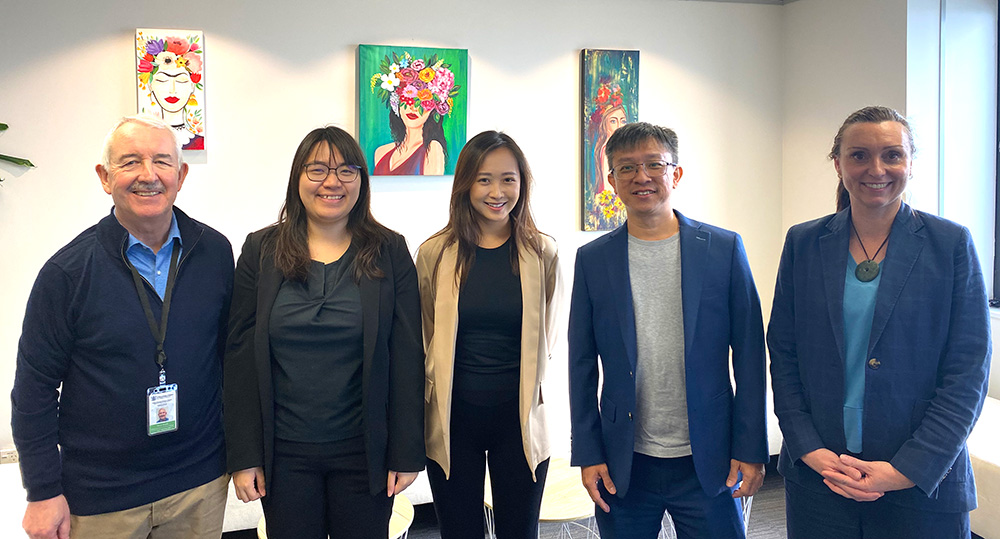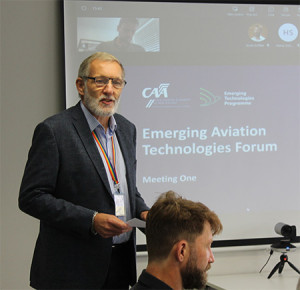The Emerging Aviation Technologies Forum is an initiative started by the Civil Aviation Authority (CAA) with support from the Ministry of Transport and the New Zealand Defence Force, and strong industry collaboration.
The purpose of this forum is to provide strategic advice to regulators regarding technologies that will enter or are likely to enter the New Zealand aviation system in the next ten years and beyond.
The Forum met on 24 July 2024 after conducting a series of workshops focused on priority technologies of Cyber Protected Aviation Systems, Space Planes, HAPS, UTM, Digital Towers, and Evolved Conventional Electric Aircraft.
The key messages from the Forum:
In addition to unpacking the six priority technologies, several technology agnostic themes emerged.
These included:
It is important that industry and government agencies continue to work together to advance aviation technological developments in support of national priorities.
The New Zealand (Aotearoa) Emerging Aviation Technologies Forum (EATF) held a well-attended meeting in Wellington on 1 May at the national office of the CAA.
The Forum is building knowledge to anticipate which aviation technologies are the most likely to enter the New Zealand aviation system in the next ten years, what the regulatory impacts might be and what it means for industry and the aviation system more generally.
Prioritising effort is vitally important, as the three aviation regulatory bodies involved, CAA, Ministry of Transport and the New Zealand Defence Force, are resource constrained.
The Forum has identified the following areas for closer examination – High Altitude Pseudo Satellites (HAPS) and Space Planes; Digital Towers and Uncrewed Traffic Management (UTM); Cyber Protected Systems and Evolved Conventional Aircraft (Electric).
The Forum considered what success would look like for this work and what timeline was needed for delivery.
The Forum agreed to:
The Forum will meet again in July and in September, following the Aerospace Summit in Christchurch (date set at Wed 25 September).
The Emerging Aviation Technologies Forum (EATF) held its fifth meeting on 21 February 2024 in Wellington.
The Forum played host to a Canadian delegation comprised of Ryan Coates, Director Remotely Piloted Aircraft Systems and Jeannine Stewart-Smith, Manager and Senior Policy Advisor, RPAS Policy, Regulations and Outreach, from Transport Canada, as well as Alan Chapman, Director RPAS Traffic Management at NAV Canada. Their attendance reinforced the similar nature of challenges faced by states across emerging aviation technologies and highlighted the value to be gained through collaboration. The delegation presented on the current RPAS landscape in Canada and the relationship between their two organisations. The Forum, in turn, provided insights from the New Zealand aviation community on navigating the regulatory challenges posed by emerging technologies.
Building upon the previous Forum occurrence, the Members reflected on the results from the weighting exercise conducted during the last meeting and subsequent rounds of input. While initial insights were consolidated, it was noted that further refinement is necessary to ensure appropriate regulatory resourcing for dealing with the more challenging issues.
As the Forum matures, maintaining the momentum already generated by these meetings is essential. Additional sessions, workshops, sub groups, or alternative ways of working will be proposed in a Forum-wide survey so membership can determine the most effective path forward.
The group remains focused on charting a course that anticipates and embraces the transformative potential of emerging aviation technologies.
The Emerging Aviation Technologies Forum (EATF) held its final meeting of 2023 on 22 November in Wellington.
This month’s discussion focussed on some of the more defined operations that are likely to become common in NZ’s aviation system in the next three years such as electric aircraft, digital towers and BVLOS RPAS, with the aim of weighting their likelihood of entering the certification system and their potential to impact the aviation system.
As emerging technologies may be disruptive, because they are novel, greater regulatory attention/resource might be required so it was great to have CAA Policy staff participating in this meeting too. In the new year, the EATF will continue working on a strategic time horizon that looks further out to around ten years.
A very big thank you to all the members of the group for giving their time, expertise and knowledge to support this endeavour.
The third Emerging Aviation Technologies Forum took place in Wellington on Friday 15 September.
During the event, colleagues from the CAA of Singapore joined in person, while participants from the CASA Emerging Technologies and Regulatory Change Unit joined online.
TAN Chun Wei, Director of Technology, Engineering, and Planning from the Unmanned Systems Group at the CAA of Singapore, and Andrew Ward, Manager of Emerging Technologies at CASA Australia, discussed their respective countries' unique approaches to certifying new technologies in aviation. Both stressed the importance of having a well-planned strategy and strong leadership to achieve successful outcomes. This discussion offered valuable external perspectives to the forum.
The CAA Emerging Technologies Unit had previously reviewed and analysed information collected from Meeting 2. They identified 26 realistic technical developments out of 79 separate activity submissions. These developments were presented to the forum, along with agreed-upon timelines for their integration into the aviation system. There was a generally strong consensus on the topics discussed. Forum members were invited to assess and review the presented material. In the upcoming meeting, there will be a focus on involving CAA Policy staff to consider any regulatory impacts these developments may have.

From left: Steve Smyth (EATF Co-chair), GAN Genice (CAAS), MOK Zi Yan (CAAS), TAN Chun Wei (CAAS), Catherine MacGowan (EATF Co-chair)
The second meeting of the Emerging Aviation Technologies Forum took place on 18 July 2023 in Wellington.
During the meeting, Catherine MacGowan from Wisk and Steve Smyth from CAA served as co-chairs, guiding the discussions on various aviation technology topics. We had a wider range of expertise than the first meeting, including representatives from airports, Aerospace Research Centre, and security. This added depth to our conversations and strengthened our exploration of emerging aviation technologies.
One of the main outcomes of the meeting was the endorsement of the Terms of Reference. Additionally, the Forum reviewed the benefits it has brought so far, especially in identifying future regulatory challenges, which will be advantageous for the aviation industry.
Given the rapidly evolving nature of technology in our industry, we emphasised the importance of revisiting the timelines for the fastest-moving aviation-related technologies regularly. The implications of this is particularly important to guide investments (both regulatory and by industry) and to understand infrastructure requirements, ensuring the safety and security of our aviation system.
A key aspect of the meeting was an intensive information-sharing workshop, led by the CAA's Emerging Technologies Unit, which provided valuable insights from the participants.
Other points to come out of this meeting included:
The Forum will meet again on 15 September 2023 after the Aerospace Summit.
 The first meeting of a new aviation regulator and industry forum took place on April 20, 2023, in Wellington. Forum members were invited to participate, based on their expertise in emerging aviation technologies in New Zealand and worldwide.
The first meeting of a new aviation regulator and industry forum took place on April 20, 2023, in Wellington. Forum members were invited to participate, based on their expertise in emerging aviation technologies in New Zealand and worldwide.
Keith Manch, the Director of Civil Aviation and Chief Executive of the Authority, highlighted the significance of the group's work and the opportunities it presented to the industry. He requested assistance in identifying aspects that regulators, working on their own, may not have discovered in a timely manner.
The Forum was co-chaired by Steve Smyth (CAA) on behalf of the aviation regulators and Catherine MacGowan (Wisk) on behalf of the aviation/aerospace industry.
Forum members stressed the importance of their work plan in terms of potential safety, climate change, and economic and social benefits.
Despite facing similar risks and challenges as the rest of the global emerging aviation sector, New Zealand is at the forefront of many technological advancements in aviation and aerospace.
The key to mutual success lies in mapping when these technologies will likely appear in the future aviation system and understanding the regulatory impacts at both the individual and system-wide levels.
Forum members recognised the rare opportunity to engage and influence aviation regulators in a positive environment with a shared goal of benefiting the industry.
Those in attendance agreed to collaborate on preparing a roadmap of emerging aviation technologies and enabling systems for the next ten years and beyond. This roadmap will be available on the Authority's website for the benefit of the industry and other agencies, and it will be updated during future forum meetings.